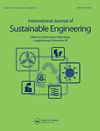Water Quality Index Model Application in Evaluation of Groundwater Quality in a Waste Treatment Facility
IF 3.6
Q3 GREEN & SUSTAINABLE SCIENCE & TECHNOLOGY
International Journal of Sustainable Engineering
Pub Date : 2022-11-15
DOI:10.1080/19397038.2022.2146775
引用次数: 0
Abstract
ABSTRACT Water Quality Index (WQI) model was utilised to evaluate the physicochemical parameters of groundwater quality at the effluent discharge and administration areas of a waste treatment facility (WTF) in Shama Municipality in Ghana. Borehole water samples were collected once a week for six months and coliform bacteria were determined in the samples using Colony Forming Unit while the physicochemical parameters were analysed using instrumental and titrimetric techniques. Twenty physicochemical parameters were used in computing the WQI of groundwater. Groundwater collected I km away and within the WTF tested negative and positive for coliform bacteria respectively. WQI classified groundwater samples collected at the effluent discharge area as poor water quality type. However, groundwater collected 1 km away and at the administration area of the treatment facility was of good physicochemical quality. The levels of EC, COD, TDS, Ca2+, Mg2+and Cl− ions exceeded the WHO drinking water permissible limits. Statistically, there was no significant difference between mean levels of physicochemical parameters of groundwater at the three locations (p < 0.05). PCA revealed that weathering and dissolution of rock minerals and human-induced activities negatively affected the groundwater quality. The WTF groundwater was unsafe for use. Aquifer development and artificial recharge for sustainable development are recommended.水质指数模型在污水处理厂地下水水质评价中的应用
采用水质指数(WQI)模型评价了加纳沙马市一个废物处理设施(WTF)的污水排放和管理区域的地下水质量的理化参数。在六个月的时间里,每周采集一次井水样本,使用菌落形成装置测定样本中的大肠菌群细菌,同时使用仪器和滴定技术分析样本的理化参数。采用20个理化参数计算地下水WQI。1公里外和WTF内收集的地下水大肠菌群检测结果分别为阴性和阳性。WQI将在污水排放区采集的地下水样本划分为水质差类型。然而,在处理设施管理区域1公里外收集的地下水理化质量良好。EC、COD、TDS、Ca2+、Mg2+、Cl -离子均超过世界卫生组织饮用水允许限量。3个地点地下水理化参数均值差异无统计学意义(p < 0.05)。主成分分析表明,岩石矿物的风化和溶蚀作用以及人为活动对地下水水质有负面影响。WTF地下水使用不安全。建议开发含水层和人工补给以实现可持续发展。
本文章由计算机程序翻译,如有差异,请以英文原文为准。
求助全文
约1分钟内获得全文
求助全文
来源期刊

International Journal of Sustainable Engineering
GREEN & SUSTAINABLE SCIENCE & TECHNOLOGY-
CiteScore
7.70
自引率
0.00%
发文量
19
 求助内容:
求助内容: 应助结果提醒方式:
应助结果提醒方式:


